What can go wrong for Europe in 2015?
Two all-too-plausible scenarios could turn 2015 into an annus horribilis for the Union.
Two all-too-plausible scenarios could turn 2015 into an annus horribilis for Europe: a further erosion of integration within the EU, and a collapse of Ukraine. Both would greatly weaken Europe’s role in the world and its foreign policy resources. To be sure, the list of things that could go wrong for Europe this year is long; these two, however, would be game-changing.
Erosion within the EU is already in progress in several ways. Triggered by the bumpy road towards treaty revision and the financial crisis, the EU has become less coherent and more intergovernmental. Politics in countries of crisis as well as those doing better has become more inward-looking. A cost/benefit approach to integration has come to dominate political bargaining in Brussels. Trust among member states is on the decline, as is the confidence voters put into national and EU politics and institutions. Populist movements or parties have emerged almost everywhere in the EU— a renationalisation of EU-powers (often including an exit from the euro) and the primacy of national interests being the major punch lines of their campaign. While actual capacity is being lost to transnational levels of policy making, a re-born “sovereignism” spreads among Europeans.
Events in 2015 will not halt these trends, but could reinforce them to a critical degree. Nine out 28 member states will hold general and/or presidential elections. In Greece, a change in government could return the eurozone to crisis mode and fuel the fires of an exit debate. In the UK, the conservative government is cornering itself further in the margins of the EU and moving closer to a departure from the Union in its struggle for political survival. France and Italy stand in the middle of controversial, but crucial, reform policies, which governments may not be able to sustain. Solidarity among states and people could weaken further and preclude much-needed joint governance reform, the necessary complement to fiscal austerity. In eleven months’ time, we may look back and say that 2015 become the tipping point of erosion—the year in which the EU’s faltering became failing, and declining integration momentum transformed into actual disintegration.
The second scenario is in the making as well. In 2014, the Ukraine crisis and Russia’s actions transformed the EU-Russia relationship from unfulfilled partnership to controlled antagonism. Sanctions and cheap oil weaken the Russian economy, currency, and government, which will harden the Kremlin’s position but weaken its ability to sway Ukraine or Europe. Ukraine’s fate has exposed the EU’s strategic dilemma. Europe wants to uphold the norms and rules of European order, but its strategic interests in integrating Ukraine do not justify full-scale support of the country. The EU wants a Europe with no buffer zones, but its policy can’t prevent their re-emergence. Meanwhile, the huge reform agenda of Ukrainian politics remains largely untouched and its political system continues to heel to the oligarchy. Kyiv’s legitimacy is dependent on its short-term output.
If or when Kyiv fails in 2015, the fragile equilibrium between Russia and the EU will collapse. The conflict over Eastern Ukraine will escalate, forcing Putin to deliver on his Neo-Russia rhetoric or slide deeper into crisis as his legitimacy is already crumbling. Both will deepen the dilemma for the EU. Brussels will have to escalate its sanctions’ regime or lose credibility and thus cut further ties with Russia, while the state of Ukraine will render the application of EU power (financial assistance conditioned on reforms) impossible. Meanwhile, if Russia escalates, Europe will no longer be able to avoid the question of arming the Ukrainian forces. These hard challenges would likely shatter the fragile unity the EU managed to hold in 2014 and expose all too brutally the Europeans’ inability to manage major foreign policy crises.
The European Council on Foreign Relations does not take collective positions. ECFR publications only represent the views of their individual authors.


